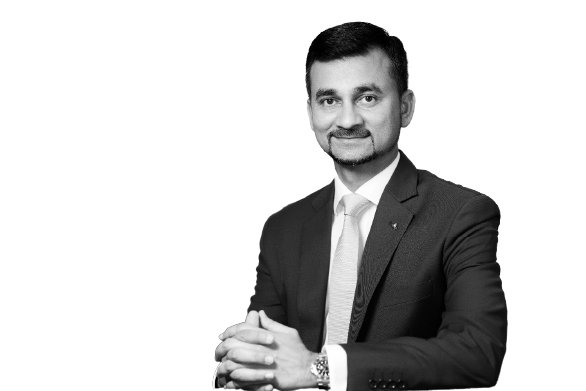 Saad Maniar, Managing Partner, Crowe Howarth, tells us why adopting international standards is key to the development of high accounting, auditing and ethical standards in the country.
Saad Maniar, Managing Partner, Crowe Howarth, tells us why adopting international standards is key to the development of high accounting, auditing and ethical standards in the country.
How is the UAE government applying IFRS to its range of financial offerings across the Emirates in order to become a world class financial capital of the world?
Currently in the UAE, listed companies – and all banks – have adopted IFRS as their financial reporting framework. The financial meltdown in 2008-2010 left in its wake heightened commercial risks, and the government moved swiftly and tightened its regulatory measures to bring back investors’ confidence. These measures included assurance in the quality, transparency, reliability and credibility of financial information provided by companies.
All major companies that are listed on the UAE’s top exchanges like NASDAQ Dubai, the Abu Dhabi Financial Exchange and those in certain free zones together with those reporting to the Central Bank prepare their financial statements using IFRS.
As the UAE continues to strive for increased investor confidence, compliance with internationally recognised standards will decrease risk to investors and help channel financial investment into the country as well as position it as one of the international world class financial capitals.
What role does the CFO play within this growth?
The CFO often gets involved in strategic decision-making processes across the board. As an economic advisor to the organisation, to the government or to the business, the CFO is tasked with the responsibility of providing the right financial information to the right people at the right points in the decision-making process. This information is critical as it is used to predict and compare outcomes against a range of alternative options, thereby enabling better economic decision-making.
As I mentioned earlier, the ability to take rational decisions based on accurate financial reports is critical in optimising sustainable and profitable growth in the country. Decision-makers want to be confident that the actions they are taking will deliver their economic objectives. Therefore, everything that the CFO does goes above and beyond the basics of ensuring statutory, regulatory and fiscal compliance.
How important is the Emirates’ newest accountancy certification body, the UAECA?
The launch of the national qualification was borne out of the need to have a certification framework that is based on UAE standards for knowledge, skills and competences and more importantly to have a local regulator. Similarly, it is intended to help streamline the current multiple sets of standards and requirements and ultimately regulate the finance and accountancy practices in the UAE.
The UAECA qualification came into being after the ACCA signed a long-term strategic partnership agreement with the prestigious local accountancy body of UAE – AAA (Accountants and Auditors Association) to enhance the finance and accountancy sector in the UAE. I sit on the members’ Advisory Board of the ACCA in the UAE, and this milestone was one of our highlights for 2014.
The introduction of a local qualification is largely seen as a precursor to a new regulatory body that is expected to map the direction for professional development and the maintenance of high accounting, auditing and ethical standards in the country.
How significant is the involvement of UAE nationals in appropriating best practices in the country’s finance industry?
The UAE is a transient country for many expats, and therefore it is important for qualified local Emiratis to take up key decision-making roles, particularly in a major industry like finance. The government and the private entities have in the recent past upped their efforts towards the promotion of the Emiratisation drive in the finance industry, to support the recruitment, development and retention of talented Emiratis.
A number of initiatives have been launched or expanded by financial entities like regulatory bodies and banks, including providing sponsorship to UAE nationals attending the country’s top universities, where qualified students are offered lucrative positions once they complete their studies. This development of Emirati talent is critical for sustainable development.
Which risks are most significant to finance professionals based in the Gulf? How do you they differ from their Western counterparts?
It’s imperative to note that any risks caused by turmoil in the global financial markets would, on principle, also become a risk in Gulf markets given the interconnectedness of the economies of the world. In other words, the Gulf is vulnerable to spill-overs from economic turmoil in Europe and America and therefore finance professionals are exposed to these risks in the same manner.
Nevertheless, the Gulf remains politically and economically volatile and financial markets are particularly sensitive to any seismic shifts in their operational boundary. The aftermath of the 2008-2010 global financial crisis adds to this market uncertainty. However, economies in the Gulf have remained resilient, shielded by the comfort of the region’s wealth in oil and gas supplies.
On the other hand, the economies of the West, especially the US and the EU, keep struggling with severe debt and deficit problems post the global crisis. Their financial systems remain fragile and can no longer be regarded as pillars of financial stability. Continued uncertainty over terrorist and extremist threats also pose significant risks that discourage financial activities and foreign investments in these Western markets.
Some risks inherent to finance professionals in the Gulf are primarily to do with uneven regulatory standards, low market liquidity and technological challenges. Whereas in global comparison, these risks are minimal as the financial markets have matured over the years, driven by solid global capital flows, technological progress and regulatory liberalisation.
It’s important to note that we have witnessed marked improvements with the establishment and streamlining of international standards for financial regulation and oversight and the formation of sound legal framework in the Gulf region. Non-compliance with global standards is increasingly regarded as a risk factor by financial market professionals.












